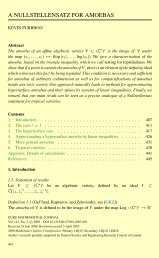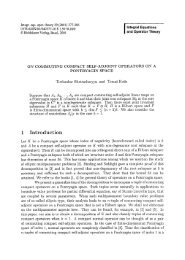computing lives - FTP Directory Listing
computing lives - FTP Directory Listing
computing lives - FTP Directory Listing
Create successful ePaper yourself
Turn your PDF publications into a flip-book with our unique Google optimized e-Paper software.
A<br />
Computer Previous Page | Contents | Zoom in | Zoom out | Front Cover | Search Issue | Next Page M S BE<br />
aG<br />
F<br />
30<br />
PERSPECTIVES<br />
ARBITRATION VERSUS CIVIL SUITS<br />
In contrast to civil suits tried in a court of law, arbitration vests the<br />
functions of judge and jury in a panel of arbitrators, typically<br />
lawyers or industry professionals, whose time is paid for by the<br />
involved parties. Arbitration is private and frequently subject to<br />
cončdentiality and nondisclosure agreements—because only the<br />
participants know the details, arbitration inćuences future litigation<br />
at a slower rate than do public court proceedings.<br />
An arbitration panel does not issue an opinion; instead, it hands<br />
down a one-page decision to award damages (or not)—typically<br />
monetary—to one party or the other. The reasoning supporting<br />
any judgment thus must be inferred from the parties’ arguments.<br />
Arbitration decisions are čnal and generally cannot be appealed.<br />
Remaining rules of court are much like those in a trial. A preliminary<br />
phase is dedicated to evidence gathering, motion exchanges,<br />
depositions, and other discovery forms. Lawyers for each party try<br />
to convince the panel of the validity of their client’s position.<br />
tems in parallel—a complex and expensive situation that<br />
it had carefully planned to avoid and that ERP Systems<br />
Integrators had assured them would not occur. When the<br />
conversion was pushed into April of the following year,<br />
Acme Co. slowed and then ceased paying ERP Systems<br />
Integrators’ invoices. In July, ERP Systems Integrators<br />
pulled its implementation team and Acme Co. initiated<br />
arbitration.<br />
Most IT projects are governed by contracts that assign<br />
responsibilities to each party and provide specific remedies<br />
for delayed implementation or project failure. Such<br />
contracts require the parties to submit to private, binding<br />
arbitration to resolve disputes. As the “Arbitration versus<br />
Civil Suits” sidebar indicates, this process slightly differs<br />
from civil litigation in a court of law. However, the use of<br />
CoCs applies equally to both settings.<br />
Almost a year passed before the arbitration hearing.<br />
Meanwhile, Acme Co. and ERP Systems Integrators<br />
deposed witnesses, and experts scrutinized sales materials,<br />
project artifacts (e-mails, status reports, project plans,<br />
and so on), contract documents, application software,<br />
migration tools, and contents of the shared-drive implementation<br />
environment.<br />
THE “STANDARD OF CARE” DILEMMA<br />
The arbitration panel had to resolve three key issues:<br />
Who was responsible for project management? Acme<br />
Co. produced paperwork indicating that responsibility<br />
rested with ERP Systems Integrators. The plaintiff<br />
claimed that it had no idea how to implement such a<br />
system and had hired the defendant to provide such<br />
expertise—including project management.<br />
What standards applied to the programming used for<br />
data conversion? Acme Co. attacked specific conversion<br />
software changes as harmful in that they<br />
COMPUTER<br />
increased the amount of incorrect data within the<br />
converted database by an unnecessarily complicated<br />
order of magnitude. ERP Systems Integrators<br />
responded that the referenced software changes did<br />
not constitute “software engineering” and thus were<br />
not subject to CoC guidance.<br />
How significant were project communication failures?<br />
During discovery, numerous intracompany e-mails<br />
from ERP Systems Integrators described the project<br />
in a markedly more pessimistic tone than the communications<br />
delivered to Acme Co. in compliance with<br />
contract provisions.<br />
These issues collectively fell under the “standard of<br />
care” portion of the contract. The dilemma Acme Co.<br />
faced—one common to companies in the same position—was<br />
detailing the standard of care it expected from<br />
ERP Systems Integrators. The contract language specified<br />
that ERP Systems Integrators “warrants that the services<br />
it provides hereunder will be performed in a professional<br />
and workmanlike manner in accordance with industry<br />
standards.”<br />
As the following exchange shows, ERP Systems Integrators<br />
could not provide more detail regarding the warranty<br />
statement:<br />
Question: What are the industry standards that you are<br />
referring to?<br />
Defense: There is nothing written or codified, but they<br />
are the standards recognized by the consulting firms<br />
in our industry.<br />
Question: I understand that the industry standards that<br />
you are referring to here are not written down anywhere;<br />
is that correct?<br />
Defense: That is my understanding.<br />
Question: Have you made an effort to locate these<br />
industry standards and have simply not been able to<br />
do so?<br />
Defense: I would not know where to begin to look.<br />
For its part, Acme Co. argued that suitable Internetbased<br />
CoCs were available to guide various behaviors.<br />
The “Online Codes of Conduct” sidebar describes one<br />
useful resource, the Online Ethics Center, that aggregates<br />
numerous CoCs. In particular, the plaintiff referenced the<br />
ACM/IEEE-CS Software Engineering Code of Ethics and<br />
Professional Practice. The “SECEPP” sidebar provides a<br />
brief history of this CoC.<br />
Acme Co. successfully argued to the arbitration panel<br />
that, when faced with obscure or publicly available standards,<br />
contracting parties should expect the accessible<br />
standards to apply. The plaintiff then cited objective,<br />
concrete portions of SECEPP that directly supported its<br />
positions on the three disputed issues.<br />
A<br />
Computer Previous Page | Contents | Zoom in | Zoom out | Front Cover | Search Issue | Next Page M S BE<br />
aG<br />
F

















